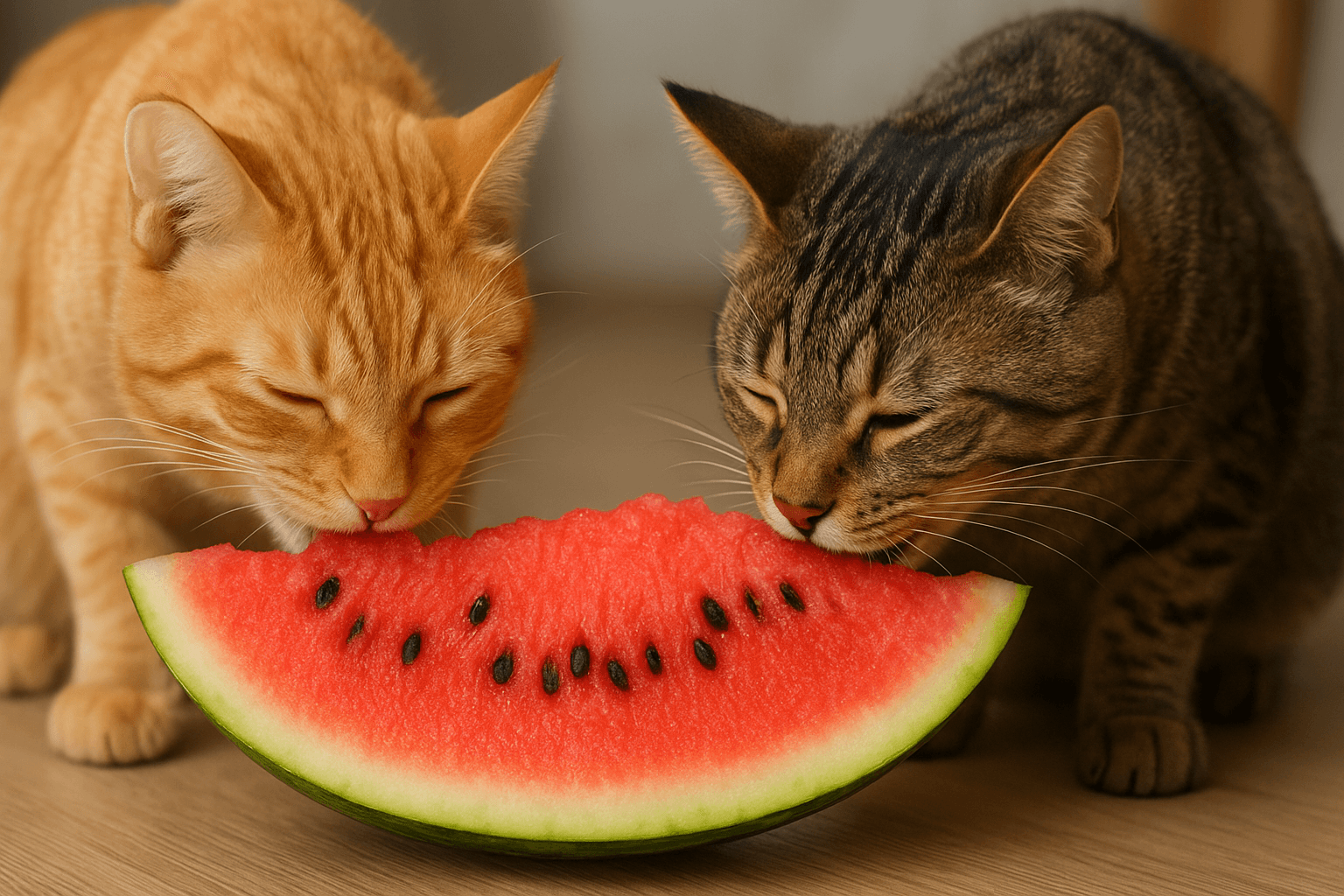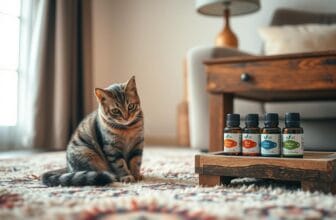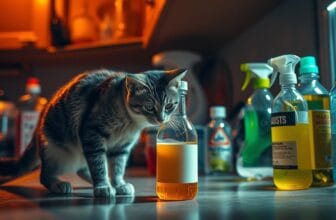
Table of Contents
Did you know a single pill dropped on the floor could be deadly for your cat? Every year, thousands of cats get sick from human medicines. This could have been prevented.
Cats are very sensitive to human medicines because of their unique metabolism. Even a small amount of common pain relievers can be very harmful. This can lead to severe poisoning and serious health issues.
Your home medicine cabinet might look harmless, but it’s a risk to your cat’s health. Knowing the dangers and taking action can save your cat’s life.
This guide will teach you how to protect your cat from medicine accidents. You’ll learn about how cats process drugs and how to spot danger signs. This knowledge could be the key to saving your cat’s life.
Understanding the Dangers of Human Medications for Cats
Cats have a special and delicate way of breaking down drugs. Their metabolism is different from ours, which can be very dangerous for them.
It’s important for pet owners to know how cats process drugs differently. Their livers work in unique ways, making it risky for them to get into human medicines.
How Cats Process Medications Differently
Cats don’t have the liver enzymes that break down many human drugs. This means:
- Drugs stay active in their bodies longer
- Toxins build up faster
- Even tiny amounts can cause big problems
Why Even Small Doses Can Be Lethal
Cats are very sensitive to drugs because of their narrow metabolic pathways. What might seem like a small dose to us can be very dangerous for them.
| Medication Type | Potential Risk Level | Metabolic Impact |
|---|---|---|
| Pain Relievers | Extremely High | Rapid Toxin Buildup |
| Antidepressants | High | Neurological Disruption |
| Heart Medications | Critical | Cardiovascular Failure |
Common Routes of Accidental Exposure
Cats can get into dangerous drugs in many ways:
- Knocked-over pill bottles
- Dropped medications
- Well-intentioned but incorrect dosing
- Curious chewing of medication containers
Always check with your vet before giving your cat any medicine. Keep all drugs out of your cat’s reach.
Most Dangerous Over-the-Counter Pain Medications
When it comes to OTC medications toxic to cats, pet owners must be very careful. Cats’ metabolisms are different from humans, making many pain relievers dangerous.
Cats can’t process human medications well because they lack certain liver enzymes. Knowing these risks can save your cat’s life.
Paracetamol (Acetaminophen) Toxicity
Paracetamol poisoning in cats is a serious emergency. Just one tablet can lead to severe problems or even death. It harms red blood cells, stopping oxygen from getting around the body.
- Symptoms of paracetamol toxicity include:
- Facial and paw swelling
- Bluish skin discoloration
- Difficulty breathing
- Vomiting
- Extreme lethargy
Ibuprofen and NSAID Dangers
Non-steroidal anti-inflammatory drugs (NSAIDs) are risky for cats. They can damage kidneys, cause stomach ulcers, and even lead to organ failure.
| Medication | Potential Damage | Risk Level |
|---|---|---|
| Ibuprofen | Kidney Failure | Extremely High |
| Aspirin | Stomach Ulcers | High |
Aspirin-Related Risks
Aspirin can harm cats by messing with their metabolism. Never give human pain meds to cats without a vet’s okay.
To keep your cat safe, learn about these dangers. Make sure to store all OTC drugs safely and out of your cat’s reach.
Antidepressants and Mood-Altering Drugs
Antidepressants are a big danger for your cats. The Pet Poison Helpline says these drugs are the top cause of pet poisoning in the U.S. Cats are very sensitive to these medicines because of their unique metabolism.
It’s important for pet owners to know about the dangers of antidepressants for cats. These drugs can cause serious problems in cats, like:
- Severe agitation
- Uncontrolled seizures
- Neurological tremors
- Extreme sedation
- Potential organ failure
Cats can’t break down antidepressants like humans do. They lack the liver enzymes needed. Even a small dose can be deadly for your cat.
“Preventing exposure is always safer than treating poisoning” – Veterinary Toxicology Expert
Medicines like SSRIs and SNRIs can cause quick and unpredictable reactions in cats. Symptoms can show up fast after a cat eats these drugs. Getting your cat to the vet right away is key to saving their life.
Keep mood-altering drugs safe and out of your cat’s reach. The best way to protect your cat is to prevent them from getting these medicines.
Human Medications Toxic Cats: Essential Safety Guide
Keeping your cat safe from harmful medicines is key. You need to watch out and take steps to prevent poisoning. Start by knowing the dangers in your medicine cabinet.

Cats are very sensitive to human medicines. Their small size and special liver make them more vulnerable. Even small amounts can be dangerous.
Recognizing Potential Toxic Substances
It’s important to know which medicines are harmful. Some common ones can be deadly for cats, even a little bit.
- Pain relievers like ibuprofen and acetaminophen
- Antidepressant medications
- Blood pressure prescriptions
- Hormone-based treatments
Prevention Strategies
There are ways to keep your cat safe from harmful medicines:
- Store all medicines in secure, locked cabinets
- Never leave pills or bottles unattended
- Keep medicines in original child-proof containers
- Wash hands after handling medicines
Emergency Response Plans
Being ready can save your cat’s life if they get poisoned. Keep these important numbers handy:
| Emergency Contact | Phone Number |
|---|---|
| ASPCA Poison Control | (888) 426-4435 |
| Pet Poison Helpline | (855) 764-7661 |
| Local Emergency Veterinarian | [Your Local Vet’s Number] |
Remember: Always call a vet right away if you think your cat has been poisoned.
Blood Pressure and Heart Medications
Cardiovascular drugs can be very dangerous for cats. What seems safe for humans can be deadly for your pet. It’s important for pet owners to know the risks.
Cats and humans process drugs differently. Beta-blockers and ACE inhibitors, used for humans, can harm cats. This is because cats don’t have the right enzymes to break down these drugs.
“Even a small dose of human cardiovascular medication can be life-threatening for cats” – Veterinary Toxicology Experts
- Beta-blockers can cause dramatic drops in blood pressure
- ACE inhibitors may lead to kidney damage
- Cats lack specific enzymes to process human heart medications
Cats are very sensitive to these drugs because of their unique body chemistry. Signs of poisoning include:
- Extreme lethargy
- Rapid breathing
- Significant changes in heart rate
- Potential organ failure
To keep your cat safe, store medications where they can’t get to them. If your cat accidentally takes a medication, call your vet right away.
Birth Control and Hormone-Based Medications
Cats are very sensitive to hormone-based medications. This makes birth control pills a big health risk. Pet owners need to know how human hormonal drugs can harm cats.

When cats accidentally eat birth control pills, it can cause serious health problems. Their delicate hormonal balance makes them very sensitive to these medications.
Effects on Female Cats
Unspayed female cats are at a higher risk from hormone poisoning. The main problems include:
- Severe disruptions to their reproductive system
- Potential bone marrow suppression
- Hormonal imbalance leading to health issues
- Immune system problems
Symptoms of Hormone Poisoning
It’s important to spot early signs of hormone poisoning in cats. Look out for these warning signs:
- Lethargy and unusual weakness
- Changes in appetite
- Unexpected bleeding or bruising
- Significant behavioral changes
If you think your cat has eaten birth control pills, get them to the vet right away. Even small amounts can be deadly. Quick action is key to saving your cat.
ADD/ADHD Medication Dangers
Medications for Attention Deficit Disorder can be very dangerous for cats. These drugs have strong stimulants that can be deadly for cats, even in small amounts.
Stimulant medication feline toxicity is a big worry for pet owners. The way these medications work in cats is very different from how they work in people.
- Amphetamine-based medications can trigger severe neurological reactions
- Methylphenidate-type drugs may cause instantaneous cardiovascular stress
- Even microscopic quantities can provoke dangerous physiological responses
Cats are very sensitive to these stimulant compounds. If they accidentally eat ADHD drugs, they can quickly face serious problems.
- Uncontrolled tremors
- Potential seizure activity
- Dangerously elevated body temperature
- Critical heart rhythm disruptions
Prevention is key to keeping your pet safe from these dangers. Keeping medications in locked cabinets and managing them carefully can help avoid accidents.
Always consult your veterinarian immediately if you suspect any medication ingestion by your cat.
Signs and Symptoms of Medication Poisoning
Knowing the signs of cat poisoning is key to keeping your pet safe. Spotting feline toxicity signs early can be a lifesaver for your cat.

Immediate Warning Signs
Medication poisoning in cats shows up quickly. Look out for these symptoms within hours of exposure:
- Sudden vomiting or persistent diarrhea
- Unusual neurological behaviors like tremors or seizures
- Dramatic changes in breathing patterns
- Extreme lethargy or sudden weakness
- Unexplained bleeding or bruising
Long-term Effects
Ignoring feline toxicity signs can lead to serious health issues. These include:
- Permanent organ damage
- Chronic kidney dysfunction
- Liver failure
- Neurological impairments
When to Contact Emergency Care
Call your vet right away if you see severe symptoms. This includes:
- Continuous vomiting lasting more than 24 hours
- Seizures or uncontrollable shaking
- Difficulty breathing
- Significant changes in behavior or consciousness
Remember: Quick action can save your cat’s life during potential medication poisoning situations.
Critical First Aid Steps for Medication Exposure
When your cat gets into poison, acting fast is key. Medication exposure can be deadly for cats. You need to act quickly and carefully.
Your main goal is to reduce harm and get your cat to the vet fast. Here are some steps to help you:
- Find out what medication your cat got into and how much
- Get your cat away from the poison right away
- Stop your cat from licking itself if poison is on its fur
- Save the poison packaging for the vet
Warning: Never make your cat vomit without a vet’s say-so. Each poison needs its own treatment. The wrong move could hurt your cat more.
Emergency Contact Information
Keep these important numbers ready:
- Your vet’s phone number
- Local vet clinic phone number
- ASPCA Animal Poison Control Center: (888) 426-4435
When you call for help, tell them everything. This includes what poison your cat got into, when, and how it’s acting. Quick, clear info helps a lot.
| Medication Type | Potential Risk Level | Immediate Action |
|---|---|---|
| Pain Medications | High | Immediate Veterinary Care |
| Antidepressants | Critical | Urgent Medical Intervention |
| Heart Medications | Severe | Emergency Treatment Required |
Remember, time is crucial in poisoning cases. Your quick, calm actions can save your cat’s life.
Safe Storage Practices for Medications
Keeping your cat safe from medicines starts with smart storage. A cat-proof medicine cabinet is key to avoiding health risks at home.
Safe storage for pets needs careful planning and habits. Cats are curious and can get into medicines if not stored right.
Medicine Cabinet Organization Strategies
- Use high, locked cabinets out of your cat’s reach
- Invest in child-proof and cat-proof containers
- Separate human and pet medications completely
- Never store medications in plastic bags or unsealed containers
Essential Storage Recommendations
| Storage Location | Safety Rating | Recommendations |
|---|---|---|
| Medicine Cabinet | High | Use locked, elevated cabinet |
| Kitchen Counters | Low | Avoid storing medications here |
| Nightstand | Low | Keep in sealed, locked drawer |
Travel Safety Tips
When traveling, keep your cat’s safety in mind. Always pack medicines in sealed, hard-sided containers to keep curious cats out. Tell your travel friends about your storage rules to keep everyone safe.
Preventing accidental medicine exposure is vital for your cat’s health. With consistent, careful storage, you can protect your cat’s life.
Common Household Medicine Dangers
Your home might have hidden dangers for your cat. Many household medicines are toxic to cats and can be very dangerous. It’s important to know which ones to avoid to keep your pet safe.
Cats are very sensitive to human medicines because of their unique metabolism. Even a small amount can be deadly. Here are some of the most dangerous medicines for cats:
- Paracetamol (Acetaminophen)
- Ibuprofen and other NSAIDs
- Antidepressants
- Birth control pills
- Blood pressure medications
- ADD/ADHD prescription drugs
Some over-the-counter medicines can be very harmful to cats. Paracetamol can destroy a cat’s red blood cells and cause liver damage. Ibuprofen and other pain relievers can cause kidney failure and stomach ulcers.
Always consult your veterinarian before giving any medicine to your cat.
To keep your cat safe, make sure to store medicines properly. Keep them in sealed containers and out of reach. Cats are curious and might try to get into them.
Prevention Tips for Pet Parents
To keep your cat safe from poisoning, you need to be proactive. Start by making your home a safe space for your pet. This means reducing risks and creating a cat-friendly environment.
Keeping your cat safe involves smart storage of medications. Make sure these are stored in places your cat can’t reach. Here are some key steps to follow:
- Store all medications in closed cabinets with child-proof locks
- Keep purses and bags off the floor and out of your cat’s reach
- Never leave medication bottles open or unattended
- Educate all household members about medication safety for pets
It’s important to watch out for places where your cat might get into trouble. Inquisitive cats can quickly explore unexpected spaces. So, it’s vital to keep up with safety habits.
| Risk Area | Prevention Strategy |
|---|---|
| Bathroom Counter | Clear medications immediately after use |
| Kitchen Surfaces | Store medications in closed containers |
| Nightstands | Use locked drawers or high shelves |
Regular checks of your home can help prevent poisoning risks. By following these tips, you’ll make a safer place for your pet.
What to Do in Case of Accidental Ingestion
A cat poison emergency can happen quickly and unexpectedly. When your cat accidentally ingests medication, acting fast is crucial. Knowing the right steps can greatly improve your pet’s health and recovery.
During a cat poison emergency, time is everything. Stay calm and act quickly to protect your feline friend from harm.
Emergency Veterinary Care Steps
- Call your veterinarian immediately
- Contact the ASPCA Animal Poison Control Center at (888) 426-4435
- Do not induce vomiting without professional guidance
- Keep the medication packaging for reference
Critical Information for Your Veterinarian
When reporting an accidental medication ingestion, be ready to give specific details:
- Name of medication
- Estimated amount ingested
- Time of ingestion
- Your cat’s current symptoms
- Your cat’s weight and age
Your quick thinking and precise information are key. They help veterinarians create the best treatment plan for your cat.
“In a medication ingestion emergency, every minute counts. Act fast, stay informed, and trust professional veterinary guidance.”
Conclusion
Keeping your cat safe from medication risks is crucial. It’s not just a suggestion—it’s a must for every cat owner. Knowing the dangers of human meds can save your cat’s life.
Start by taking simple steps: keep meds safe, handle them with care, and always check with your vet. Your quick actions can stop poisoning and save your cat. Remember, what’s safe for us can be deadly for cats.
Learning is key to keeping your cat healthy. Use the tips from this article to make your home safer for your pet. Share what you know with others to help more cats stay safe from meds.
Your effort to keep your cat safe shows how much you care. Stay up-to-date, be ready, and always put your pet’s health first.
FAQ
Can a single human pain pill kill my cat?
Yes, even a small dose of over-the-counter pain medications like ibuprofen or acetaminophen can be lethal to cats. This is because cats can’t process these drugs well.
How quickly can medication poisoning affect my cat?
Symptoms of poisoning can show up in 30 minutes to several hours after ingestion. It depends on the type and amount of medication. Quick vet care is key for survival.
What are the most dangerous types of human medications for cats?
Pain relievers (NSAIDs), antidepressants, blood pressure medications, ADD/ADHD stimulants, and birth control pills are very dangerous. They can cause severe organ damage, seizures, and even death in cats.
How can I prevent my cat from accessing human medications?
Keep medications in locked cabinets. Use containers that are child and cat-proof. Store pills in sealed, high places. Never leave medications out where pets can get them.
What symptoms should I watch for if I suspect medication poisoning?
Look for vomiting, diarrhea, lethargy, seizures, and trouble breathing. Also, watch for changes in behavior, excessive drooling, and loss of coordination. These signs could mean your cat has been poisoned.
What should I do if my cat ingests a human medication?
Call your vet or a pet poison hotline right away. Have ready the type of medication, how much your cat ate, and when. Don’t try to make your cat vomit without a vet’s advice.
Are prescription medications more dangerous than over-the-counter drugs?
Prescription drugs are often stronger and can be more harmful than over-the-counter ones. Drugs for heart issues, mental health, and hormones can be especially toxic to cats.
Can veterinary medications also be dangerous to cats?
Yes, vet meds can be dangerous if not given right. Always follow your vet’s exact dosage instructions. Never give meds meant for one pet to another.
How long do medication toxicity effects last in cats?
The effects can last from days to weeks, depending on the drug. Some can cause long-term organ damage or chronic health problems.
Are some cat breeds more sensitive to medication toxicity?
Cats with health issues, older cats, and some breeds with liver or kidney problems are more at risk. They can have severe reactions to medications.







